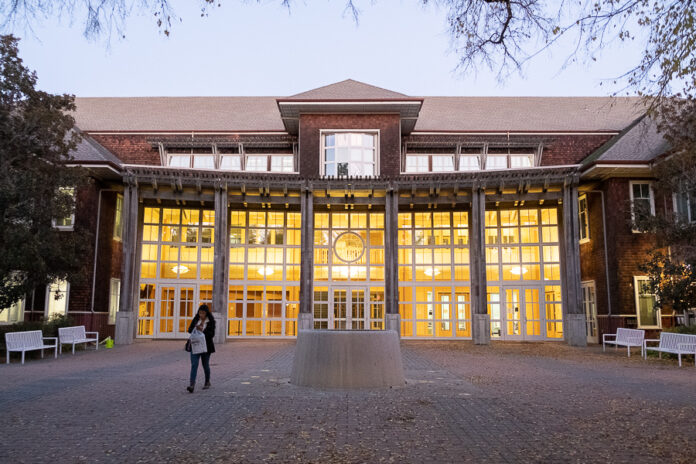UCLA law professor, AACSC seek access to data showing whether UC system violated Proposition 209
Dr. Richard Sander, a law professor at UCLA, is accusing the UC system of illegally using race as a factor in admissions decisions.
Sander requested — and was subsequently denied — access to the UC’s admissions data. He, alongside the Asian American Community Services Center (AACSC), filed a lawsuit on Nov. 15, 2018 against the university system under California’s Public Records Act.
The petitioners claim this data is public information and feel that the UC’s unwillingness to hand it over proves that it has something to hide — namely, the usage of affirmative action tactics in its admissions processes.
Sander, who has studied racial preferences and their effects on student outcomes extensively, is pursuing this data not only for his own research but also because he feels individuals have a right to access this information, which is technically public.
The UC honored Sander’s requests years ago, giving him and many other scholars access to an extensive database that held information regarding admissions between 1992 and 2006. According to a press release Sander sent to The California Aggie, however, the university has “adamantly refused to provide the same data for admissions covering the years since 2007.”
The university claims it cannot honor Sander’s request because this would require it to create a specific type of report and would compromise applicants’ privacy.
“Creating a responsive report that would adequately protect the privacy of the individual applicants involved would impose an extensive burden on University resources,” said Claire Doan, the director of media relations for the UC Office of the President, via email. “UC personnel estimate that it would take us weeks of full-time work to create a specialized data set for Prof. Sander.”
In an interview with The California Aggie, Sander said he is more than willing to pay the fee to obtain such data, which would cost around $8,000. He stated that he also believes the university’s supposed concern over applicants’ privacy is irrelevant because the data from 1992 to 2006 has been analyzed for more than 10 years and nobody has been able to identify any of the applicants.
“The lawsuit is […] seeking the same type of information that the university willingly provided 10 years ago,” Sander said.
When asked what the best possible outcome of the lawsuit would be, Sander said that the UC should be consistent in its transparency policies.
“The last time we did this, it didn’t cost us very much and nobody’s personal information was jeopardized so there’s really no reason, now that we think about it, that we shouldn’t do this,” he said.
According to Doan, the university does not have to comply with the request even if Sander were to pay, citing recent court cases ruling that public agencies do not have to produce new records to fulfill a request akin to Sander’s.
“In November 2016, a San Francisco trial court confirmed that state law does not require public agencies to create new records in order to respond to a public records request,” Doan said. “In August of this year, the California Court of Appeal affirmed the trial court’s decision in a unanimous published decision.”
If the university makes this data available, Sander said he foresees it serving as a catalyst for conversation around the issue. If the data were to show that UC campuses are using racial preferences once again, Sander thinks California should explore different avenues to address the matter.
“It might be a hearing at the state legislature, there might be a lawsuit asking a judge ordering the university system to stop discriminating, it might lead to a new referendum on whether the university should be banned from using racial preferences,” Sander said. “There are a lot of possible outcomes, but I think they will all be furthered along by using accurate information on what’s happening.”
Though this lawsuit is only aiming to produce withheld admissions data, with it Sander and AACS President George Shen allege that the UC is breaking the law and factoring race into its admissions process.
UC Davis itself has an intimate history with affirmative action, dating back to the 1978 Regents of University of California v. Bakke Supreme Court case.
Allan Bakke, a white applicant to the UC Davis Medical School, was denied admissions twice, although his test scores and GPA exceeded those of minority students who had been admitted.
The Supreme Court ruled that a state may consider race as a factor in its admissions process, if other factors are taken into account as well. The case established that the use of affirmative action in admissions decisions was constitutional, while the use of racial quotas was not.
Years later, Proposition 209, appearing on California’s ballot in Nov. 1996, sought to eliminate affirmative action programs in areas such as public employment and education. This measure was passed, reversing the Bakke decision and making it effectively illegal for California public schools to consider race throughout the admissions process.
Over the past few months, however, there has been scrutiny over affirmative action’s role in the UC system, and questions have arisen regarding its alleged presence in the admissions process.
These accusations take place in the wake of the Harvard discrimination trial, which debates whether or not white and Asian American individuals were discriminated against in admissions decisions. A key difference between Harvard and the UC, however, is that the former is not subject to the standards that Proposition 209 set — therefore, it’s perfectly legal for Harvard to factor race into its admissions but illegal for the UC system to do so.
“[The Harvard trial] demonstrated real reason for concern about whether our most prestigious private universities are treating Asian-Americans fairly,” Shen wrote in an email forwarded by Sander to The California Aggie. “We believe there is just as much reason for concern about anti-Asian-American discrimination at our nation’s top public university system [the UC].”
Written by: Claire Dodd — campus@theaggie.org





